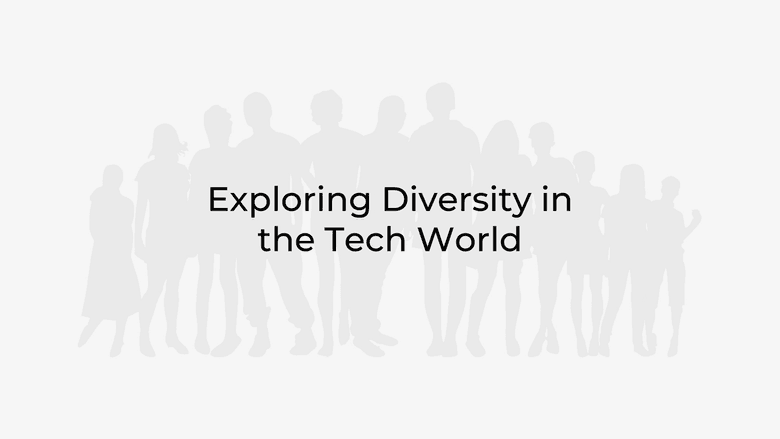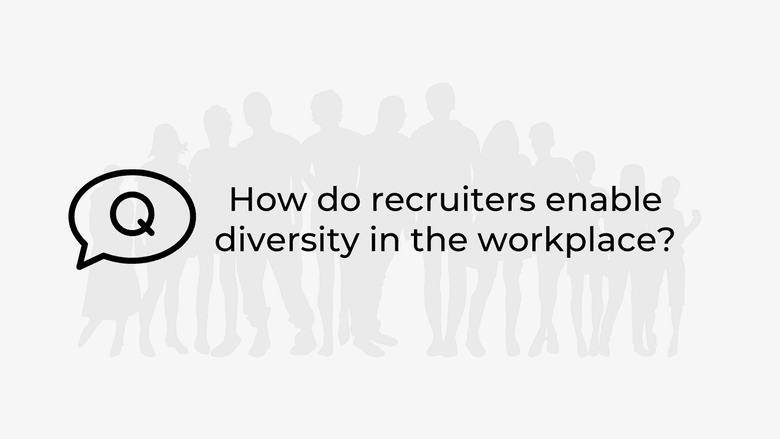A recruiter's view on promoting diversity
We chat with a career recruiter about how important the recruiter role is in promoting diversity and what work is yet to be done.

It’s no secret that the tech industry has a diversity problem.
In 2019, Wired reported that in the last five years, the share of U.S. technical employees who are Black or Latinx has risen less than one percent at Google and Microsoft.
Apple’s percentage of Black technical employees remained unchanged at six percent, despite the fact that the U.S. population is 13 percent Black.
And as more CEOs in the industry raise their voices in support of the Black Lives Matter movement, more people are calling upon companies to take action beyond bombastic Instagram posts and taglines.
The real action starts by hiring more diverse employees and driving real change.
The responsibility for bringing in these diverse candidates falls partly upon technical recruiters, the people looking through hundreds of applications and deciding who could be a good fit for a company’s job openings.
To get a better idea of what recruiters do and how they enable diversity in the workplace, we spoke with Vladimir Cabrera, a technical recruiter at Airbnb. Cabrera boasts over five years of experience in the recruiting space since graduating from college in 2014. After working for Zillow for four years, he joined Airbnb in 2019 and is now a full-cycle recruiter specializing in product management recruiting.
Note: Thoughts expressed by Vladimir Cabrera are his own and do not necessarily reflect the beliefs of Airbnb as a company.

Full-cycle recruiters are responsible for owning the recruiting process from start to finish. This involves meeting with hiring managers to discuss their needs, screening potential candidates and closing offers.
In a typical day, Cabrera says he spends his time reviewing applications, searching for candidates through LinkedIn and meeting with hiring leaders to shape their recruiting strategy. It’s his job to make sure the hiring process is consistent and that all candidates are assessed fairly.
His favorite part of the job, he says, is bringing in smart talent and seeing them make an impact at the company.
“As a recruiter, we actually have a really cool opportunity to shape what a company will look like and what products will look like as well, too,” says Cabrera. “It’s really cool being able to hire somebody and see them build something that you see on the product and feel like I’m kind of responsible for that in a way.”

In some sense, recruiters act like the gatekeepers for jobs in tech. They are the first point of contact and hold the power to reject or move an applicant forward after a quick glance at a resume. When addressing the lack of diversity in the tech industry, recruiters must be part of the conversation.
Cabrera himself does not take his responsibilities lightly, especially when it comes to prioritizing diversity. He believes recruiters are huge drivers of change because they have the potential to make a real impact by building out a diverse pipeline of candidates and working toward a more inclusive workplace that is more representative of the world we live in.
At Airbnb specifically, Cabrera says the company has specific measures in place to ensure teams are assessing a diverse pool of candidates. For example, teams are often required to meet with a certain percentage of applicants who are from an underrepresented background before candidates are invited to an on-site interview.
As a recruiter, Cabrera says it is his job to hold hiring leaders accountable to this and make sure that the company is interviewing a wide range of candidates. Sometimes this means slowing down the entire hiring process to ensure these standards are met.
However, Cabrera believes that hiring people from underrepresented backgrounds is just the beginning.
“I’ve always felt that bringing in diverse people into tech is just like the band-aid. I feel like the actual sort of work that needs to be done has to be done around retainment and growth opportunities for folks that come from diverse backgrounds,” Cabrera says. “Just bringing in somebody to increase the percentage points, that’s cool for PR but it doesn’t really do anything for the person that comes into the company and is not getting any sort of value out of it.”
As an example, he brings up a specific mentoring program at Airbnb for Black employees. The program is built on a solid framework where participants receive feedback, trainings, and ongoing mentorship to help mentees succeed. These kinds of resources go a long way in helping support employees from underrepresented backgrounds and allowing them to grow in their careers, he says.

Getting noticed for internships and jobs in the tech industry is no easy feat, especially when many job openings receive hundreds (or even thousands) of applications. It’s especially challenging to get noticed if you’re someone from an underrepresented or non-traditional background.
But how do you prove yourself to a tech recruiter if you didn’t graduate from college with a flashy resume that includes internships at Google, Facebook, and Amazon?
Cabrera offers these three helpful tips to anyone looking to get noticed by recruiters.
1. Create your own side projects
Spearheading your own personal projects is one way to show that you are passionate and have initiative – two things recruiters often look for when they are screening candidates. Whether it’s building an app with some friends or testing new applications for AI, set aside time for working on fun side projects that can build your skills and show recruiters what you’re capable of.
2. Make sure your portfolio/Github are on point
When it comes to job applications, make sure you’re putting your best foot forward when displaying your work. If you’re a computer scientist, document your projects using Github and include the link in your application. If you’re a designer, make sure you have an online portfolio that is engaging and easily accessible.
3. Join professional networking organizations
If you’re someone from an underrepresented background, consider joining one of the several professional networking organizations like the National Society of Black Engineers or the Society of Hispanic Professional Engineers. Not only will these organizations provide you with great mentorship and learning opportunities, they can also get you noticed by recruiters.
The information provided herein is for general informational purposes only and is not intended to provide tax, legal, or investment advice and should not be construed as an offer to sell, a solicitation of an offer to buy, or a recommendation of any security by Candor, its employees and affiliates, or any third-party. Any expressions of opinion or assumptions are for illustrative purposes only and are subject to change without notice. Past performance is not a guarantee of future results and the opinions presented herein should not be viewed as an indicator of future performance. Investing in securities involves risk. Loss of principal is possible.
Third-party data has been obtained from sources we believe to be reliable; however, its accuracy, completeness, or reliability cannot be guaranteed. Candor does not receive compensation to promote or discuss any particular Company; however, Candor, its employees and affiliates, and/or its clients may hold positions in securities of the Companies discussed.
